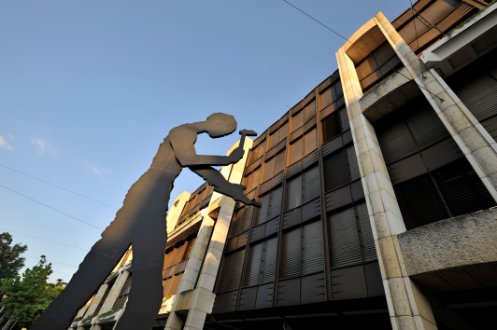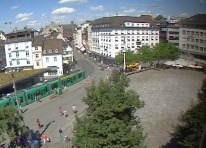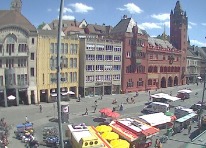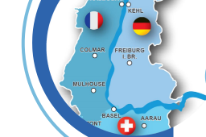Aiming for a successful career
Education is our most important resource. As a business and research location, Basel is dependent on highly trained professionals and creative minds. The Canton therefore invests heavily in the schools, the University and the University of Applied Science.
The University of Basel is the oldest university in Switzerland. With its numerous research institutes, it has been an international leader for many years. The University of Applied Science North-Western Switzerland (Fachhochschule Nordwestschweiz) is the link between research, society and business. The public schools prepare children and young people for an successful professional career, while the international schools reflect die the diversity of highly qualified families in and around Basel.
Schools and the education system
High priority for schools
Free state schools enjoy a high priority in Switzerland. The Canton of Basel-Stadt invests heavily in the education of children and young people, and in training teachers. Furthermore, the schools maintain a good relationship with the parents and businesses. In fact, half of all young people complete an apprenticeship in a company that is associated with an education based on a specific sector of industry.
The education system
Compulsory schooling lasts for 11 years, including two years of nursery school. After completing compulsory schooling, young people start an apprenticeship (basic vocational training with a vocational college) or continue their education at a secondary school. Basel-Stadt reorganised its school system in recent years. Further information on this subject is available on the education department pages:
School holidays
Twelve weeks of school holidays are spread throughout the year: Six weeks in the summer, from July to mid-August, two in the first half of October, one to two at Christmas time, two in the winter (February/March), as well as ten days around Easter time. Also, depending on the school year, one-week summer camps and ski camps are organised during school-time.
- Go to School holiday calendar
Private schools
For those who would prefer not to use the free state school system, there are several private schools of varying pedagogical orientation in the Basel region from which they can choose. However, not all private schools cover all school years, so it is worth talking in person with the Head of the relevant school you are interested in. You can find a list of recognised private schools in Basel-Stadt here
International schools
International schools are of huge importance in a city with so many global companies. They offer children and young people an internationally recognised qualification, usually in several languages. However, not all international schools cover all school years, so it is worth talking in person with the Head of the relevant school you are interested in. Here is a list of the international schools in the Basel region:
- academia International School
- Bilingual Kids Academy (BKA)
- Ecole Française de Bâle
- ELA Basel Primary School
- Il Girasole
- International School Basel
- Les Coquelicots
- SIS Swiss International School
University and colleges
The University of Basel
The University of Basel is one of the most successful research universities in Europe, uniting as it does life sciences and medicine, natural sciences, as well as the humanities and social sciences in one institution. International rankings regularly place it among the 100 top universities in the world based on its research achievements.
Around 13,000 students and doctoral candidates from over 100 countries are currently enrolled in its seven faculties. They benefit from a multifaceted offering of courses that are based on cutting-edge research. The bachelor, master and doctoral programmes prepare students for careers in a rapidly changing world, equipping them to take on demanding tasks and perform them expertly and responsibly.
Founded in 1460, the University of Basel is the oldest university in Switzerland. Its diversified range of competencies ensures a high level of innovation, enabling it to tackle the complex problems of our time and contribute to scientific, economic and social development. To continue achieving this, the University of Basel fosters the transfer of knowledge and technology and maintains intensive dialogue with its surrounding environment. It is firmly anchored in the economically dynamic Basel region and has close links to national and international partners.
International network
The University of Basel has been part of the international university network of Eucor together with the universities of Freiburg i. Br., Karlsruhe, Strasbourg and Mulhouse-Colmar, since 1989. This permits the students to move freely between the universities. It also opens up the possibility of offering joint courses, the mutual recognition of academic achievements, the exchange of lecturers and joint research programmes.
The Basel School of Business focuses on students such as graduates of the International School and employees working for large companies in the region and offers bachelor's degrees as well as MBAs and EMBAs in English.
The University of Applied Sciences Northwestern Switzerland
With 12,000 students and colleges located in Basel, Muttenz, Olten, Brugg-Windisch and Solothurn, the Fachhochschule Nordwestschweiz FHNW (University of Applied Sciences Northwestern Switzerland) comprises nine departments that cover music, design and art, education, life sciences, technology, architecture, social work, applied psychology and economics. The FHNW, like the University of Basel, is an intercantonal institution subject to public law and with the right to autonomy. Its practice-oriented approach makes it an important partner to society, the economy and culture.
Close to business
The University and FHNW carry out important basic research and collaborate with industry in many areas. An example of this is the Friedrich Miescher Institute for Biomedical Research, which was founded by two local pharmaceutical companies. It is a globally recognised leading institute for basic research in biomedical sciences. There are also close relationships with the Swiss Tropical and Public Health Institute Swiss TPH, one of Switzerland's leading institutions in the field of public and global health.
The Basel Incubator is a further manifestation of the connection between educational institutions and the private sector. It supports spin-offs from the FHNW and other start-up companies with a low-cost infrastructure and proven coaching.
Fruitful cooperation
An example of this is the campus of knowledge being developed at the headquarters of Novartis. The ETH Zurich is also building a new life sciences campus which will house its Biosystems Science and Engineering department from 2022 on the Schällemätteli campus close to the Biozentrum (The Center for Molecular Life Sciences), the University Hospital and the University Children's Hospital Basel.
Further Education
Basel offers a wide selection of opportunities when it comes to further education:
- The Advanced Studies centre of the University of Basel offers over 150 postgraduate and part-time continuing education courses in all disciplines.
- The University of Applied Sciences Northwestern Switzerland offers a wide range of further education opportunities in all of its specialist disciplines.
- The Volkshochschule beider Basel has numerous opportunities on offer in the areas of general further education, language courses and post literacy courses for adults, and the Seniorenuniversität offers talks by the University lecturers specifically designed for people of retirement age.
- Adults who attended a secondary school in their youth can attain a Cantonal Matur in the Matriculation Courses for Adults (MfB), which can grant them admission to some of the colleges in the region.
- In addition, a number of private schools offer courses in languages, computer science and commerce.
Working in Basel
Good reasons for Basel
Basel is an extremely dynamic economic region and one of the world’s leading locations for Life Sciences. Two of the world’s five largest pharmaceutical companies – Novartis and Roche – were founded in Basel and also have their headquarters here. A large number of innovative research companies have grown up around them, in the areas of chemicals, biology, medicine and nanotechnology. Other industries have also enhanced Basel’s international reputation: trade and logistics, financial services and insurance, IT, design and architecture. They have all created countless exciting jobs and have attracted many highly-skilled people from all over the world.
Tens of thousands of Germans and French employees cross the borders daily in order to work in Basel and profit from excellent working conditions: high wages, low deductions, low taxes and good social security. Many interesting jobs are thereby available in Basel in an exciting and dynamic environment.
On the other hand, companies can find highly motivated and committed employees in Basel. At 40 to 42.5 hours per week for a 100% employment, working hours are longer than most countries in Europe. There is also a very favourable environment for business, and the local authorities are very cooperative. All these factors make Basel an attractive place to live and work.
Working conditions
-

- The Hammering Man by artist Jonathan Borofsky on Aeschenplatz.
- Photo: Juri Weiss
Working conditions in Switzerland are excellent. They are based upon a well-established social partnership between employer and employee. The first month of a new employment relationship is considered a trial period. The period of notice during this period is seven days. However, the contracting parties may agree shorter or longer trial periods and periods of notice. The trial period may not exceed three months.
Working hours are between 40 and 42.5 hours per week for a 100% employment, with at least 4 weeks paid holiday a year. Employees under 20 are entitled to five weeks' holiday. Many companies offer their employees more holidays. Pregnant women benefit from special protection and receive at least 14 weeks’ maternity leave. The bill for paid paternity leave was approved in a referendum held in 2020. This allows fathers to take two weeks of paid leave within six months of the birth of a child. Like maternity allowance, the leave is financed through the Income Compensation Scheme (Erwerbsersatzsordnung).
Salaries
Salaries are generally paid on a monthly Basis. Payment of a 13th monthly salary is a common practice. Many companies have profit-sharing schemes, and pay out (voluntary) bonuses when business is good.
Allowances
In Switzerland, employees with children receive a mandatory child’s allowance for each child, the amount of which varies from canton to canton. In Basel-Stadt, many companies also pay an additional education allowance to employees with children. Other allowances vary from employer to employer.
Deductions
Contributions towards the obligatory old-age pension, "Alters- und Hinterlassenenversicherung", AHV (Old Age and Survivors Insurance), "Invaliditätsversicherung", IV (Invalidity Insurance) and the "Erwerbsersatzordnung", EO (Substitute Employment Regulation). Unemployment Insurance amounts to about 1.5%. Both employers and employees contribute to the social security system. Employees’ contributions are deducted directly from the monthly salary. Taxes are to be paid extra.
Social Security
The system of old age pensions in Switzerland is based on three pillars. The Old Age and Survivors' Insurance (AHV) is compulsory and is funded by salary deductions. It is built on a solidarity-based intergenerational contract in which today's employees use their AHV contributions to finance the pensions of pensioners, provided that they themselves have made AHV contributions.
By contrast, the pension fund is used by employees and employers to pay contributions into a personal account. The capital can then be accessed upon retirement. All employees who have already been insured in the 1st pillar and earn at least CHF 22,050 per year are covered. (Status: 2022). Compulsory insurance begins once a person enters into employment and is at least 17 years old. Insurance is not compulsory for certain individuals, such as the self-employed and employees with a fixed-term employment contract of no more than three months. In certain cases, they can voluntarily choose to insure themselves for the minimum pension amount.
The 3rd pillar is voluntary, however. Contributions to a private retirement account or into a private pension insurance can be deducted from tax up to a statutory maximum level.
Unemployment insurance is also financed by contributions from all employees. In the event of unemployment, 70% of the last salary is paid out for a maximum of two years.
Work permits
Anyone applying for a job in Basel as a person from a third country or as a cross-border commuter does not need to worry about the work permit. […] It also often requires the approval of the Federal Office for Migration in Bern.
EU and EFTA citizens who take up employment in Basel register for residence with the Swiss municipality of residence.




